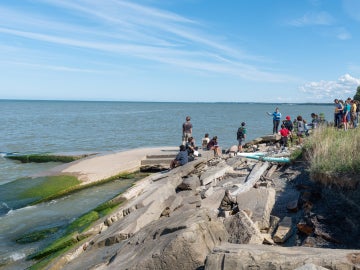Tackling Society’s Greatest Challenges in StudiOC
September 19, 2017
Amanda Nagy

Assistant Professor of Environmental Studies Chie Sakakibara is one of the instructors of the No Art, No Voice? learning cluster offered this fall in StudiOC.
Photo credit: Yevhen Gulenko
Oberlin’s Center for Convergence (StudiOC) launched this fall in a dynamic, modern space in the Peter B. Lewis Gateway Center.
Since its founding, Oberlin has attracted thinkers who challenge convention and aren’t afraid to confront contemporary social issues.
The changing world needs liberal arts graduates more than ever, but how we tackle society’s biggest problems requires a new way of thinking. Convergent learning, explains Dean of the College of Arts and Sciences Tim Elgren, “comes back to the idea of what we believe a liberal education was built to do”—bringing together multiple disciplines to address scientific and societal changes.
“By thinking in a way that’s big and expansive, and not just mired in our own disciplinary perspectives, you can confront the most intractable problems of our time,” says Elgren, who spearheaded Oberlin’s Center for Convergence (StudiOC), an innovative education space in the Peter B. Lewis Gateway Center.
Launched this fall, StudiOC is centered on theme-based learning communities that pursue multidisciplinary collaboration. Each semester-long learning community consists of two to three courses from different academic departments. Faculty and students within a learning community work together at key points throughout the semester for multidisciplinary discussion, shared assignments, and programming.
Elgren says the concept emerged from discussions with faculty department chairs, who expressed a desire to work outside of their discipline. But he credits the collaboration with Andrea Kalyn, dean of the conservatory, and Mike Frandsen, then-vice president of finance, as pivotal to the conceptual development and envisioning the novel space as its home.
“When we think about mass incarceration, the modern refugee crisis, the post-fossil fuel economy, and fragile and emerging democracies—these issues really rise above many of our disciplinary perspectives. So the question is, what are those problems now, and how does Oberlin College mobilize itself as a community to think about those things? The goal has always been to try to throw ourselves at these big problems, and at the same time, provide a framework to explore some really interesting topics.”
A biochemist, Elgren used to teach a course for non-majors called Miracles, Disasters, and Everyday Chemistry. It turned out that the course was appealing to science majors, too.
“I thought they were just enrolling in it as a blow-off. Well, in real life, they all had a strong science background and wanted to see how it applied to their real life. There’s a real ask on the part of the students to see a broader view of the impact of science. They really want to see practice. Of course, the laboratory does that, but we can think of StudiOC as a liberal arts laboratory.”
The learning communities, or clusters, offered this fall include Sports, Culture, and Society; Matters of Fact, Matters of Fiction; No Art, No Voice? Marginalized Cultures and the Arts of Survival; and Arts and the Overlooked: The Activism of Access.

In the StudiOC clusters, faculty and students collaborate to connect disciplinary insights and lessons from individual classes in order to tackle these challenges and themes. “While Oberlin students have always made these connections in an informal and personal way, StudiOC is designed to make these connections a learning goal,” says David Kamitsuka, senior associate dean of the College of Arts and Sciences.
“This environment can be of great benefit for our faculty, too, because it can be a real spark for faculty collaboration on research,” Kamitsuka says.
StudiOC is a modern, flexible space that adds an academic component to the mixed-use Gateway Center on East College Street. The classrooms are outfitted with video-conferencing technology that can connect the cluster classes with other institutions in the country or abroad. This global-classroom concept also lends itself to a study away experience without having to leave campus.
Kamitsuka says a parallel can be made to the Danenberg Oberlin-in-London program, in which two or three faculty collaborate around an interdisciplinary theme and students form a learning community. “Like the London program, students and faculty are involved in an immersive educational experience that includes not only shared classes, but also shared programming and student projects.”
And, just like study away, the course topics can be related to a student’s major or completely outside their discipline.
“For many students, there are barriers to study abroad,” says Elgren. “When we look at student engagement survey data, students have described study away as the single-most transformative event of their college experience. We want them to have a way of engaging with the world, and the StudiOC technology can provide the format to make that happen.”
Looking forward, Kamitsuka says the learning communities will involve more courses in the natural sciences. Some themes faculty have proposed for future clusters include: global dimensions of infectious disease; music and the brain; climate change and culture; and the global refugee crisis.
You may also like…
Research Roundup
Every day, Oberlin’s faculty and students produce scholarly work that uncovers new insights into how we understand the world, particularly in the areas of sustainability and the environment.
Three Things with Jillian Scudder
Oberlin’s astrophysicist-author shines a light on our dark universe.
My Cousin the Comb Jelly
The research of Darrin Schultz ’13 deepens our insights into animal evolution.


